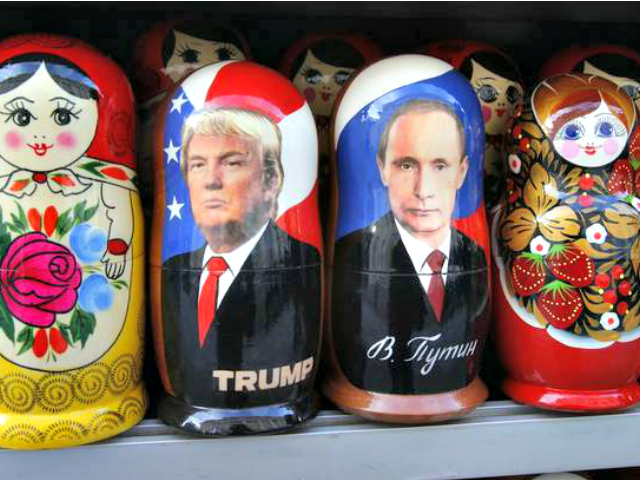Donald J. Trump was the only U.S. president in the past two decades to stop Russian President Vladimir Putin. The others — George W. Bush, Barack Obama, and now Joe Biden — all saw Putin seize foreign territory by force during their terms.
The reason is simple: Trump was polite but tough, and unpredictable; while Bush, Obama, and Biden all attempted to appease the Russian leader, on the theory that past American assertiveness was the real problem, and Putin’s reaction was understandable.
In 2008, while a weakened and unpopular Bush was in Beijing, China, to watch the Olympics, Putin invaded Georgia. In 2014, after Obama had promised Putin that he would have more “flexibility”in his second term, Russia infiltrated Crimea and later annexed it.
And now, in 2022, after Biden botched the withdrawal from Afghanistan and removed sanctions from the Nord Stream 2 pipeline, Putin has invaded Ukraine.
In every case, Putin responded to American weakness with aggression.
Trump was accused, falsely, of “collusion” with Russia, and was frequently criticized for being too polite to Putin in public. A press conference in Helsinki, Finland, in 2018, where Trump accepted Putin’s public word that Russia had not interfered in the 2016 American presidential election, was said to be a disaster.
Yet during the four Trump years, Russia did not attempt to expand its earlier territorial gains in Ukraine, nor did it seriously threaten to invade any other country on its lengthy borders.
The reason: Trump was tougher on Russia than any of his predecessors, or his successor.
He attacked Syria, a Russian ally, and wiped out Russian mercenaries in a confrontation with U.S. troops there; he slapped sanctions on Russian officials, and the Nord Stream 2 pipeline; he called out Russian cheating on past nuclear treaties; he provided military aid to Ukraine; he forged closer relations with frontline NATO states; and he boosted U.S. energy production, exporting natural gas to Europe.
Trump proved he was tough with pinpoint strikes that achieved American strategic goals without sending Americans to fight wars overseas. Arguably, the fact that he showed he was willing to use force in small ways prevented him from having to do so in in large ways.
The targeted strike on Iranian terrorist general Qasem Soleimani in 2020, for example, blunted Iran’s regional ambitions. Biden, like the rest of his party, opposed that operation, claiming it would lead to war — which it did not.
Trump was also unpredictable. Putin knew that Obama and Biden, and to a lesser extent Bush, could be counted on to seek “diplomacy” as an end in itself. That was not true of Trump, whom the media warned might start World War III. (Perhaps Putin believed it.)
Trump pledged to keep the U.S. out of new foreign wars, but the actions of a man who launched airstrikes against Syria while he had chocolate cake served to the Chinese premier at Mar-a-Lago could not easliy be predicted.
Every president other than Trump who has had to deal with Putin, who came to power at the end of Bill Clinton’s term, has made the same mistake: they have treated him as a man understandably aggrieved by the end of the Soviet Union, who could be appeased by concessions that restored some sense of pride.
Bush claimed, after meeting with Putin, that he had “a sense of his soul,” then did nothing about Georgia. Obama — and his hapless Secretary of State, Hillary Clinton — pushed the “reset” button to erase the mistrust supposedly caused by Bush, and gave Putin concessions on missile defense and nuclear arms. Biden reversed Trump’s policy on Nord Stream 2 and extended the “New START” nuclear disarmament treaty with Russia.
Trump also understands the basics of international strategy better than the sophists of the Washington establishment. On Thursday, deputy presidential adviser Daleep Singh claimed the following:
Strategic success in the 21st century is not about a physical land grab of territory. That’s what Putin has done.
In this century, power — strategic power is increasingly measured and exercised by economic strength, by technological sophistication, and your story — who you are, what your values are, can you attract ideas and talent and goodwill. On each of those measures, this would be a failure for Russia.
We are governed by people who care more about the “story” than about defending borders. Singh’s comments echoed then-Secretary of State John Kerry in 2014, who complained Putin was playing by “19th century rules” when he seized Crimea.
(On Thursday, Kerry was mocked for saying that he hoped Putin’s invasion did not stop the fight against climate change.)
Only President Trump took Putin seriously as a threat. He was polite, as he was to the leaders of North Korea and China, but he kept Putin within bounds, without expressing guilt about the use of American power.
Hence we had four years of peace. Until now.
Joel B. Pollak is Senior Editor-at-Large at Breitbart News and the host of Breitbart News Sunday on Sirius XM Patriot on Sunday evenings from 7 p.m. to 10 p.m. ET (4 p.m. to 7 p.m. PT). He is the author of the recent e-book, Neither Free nor Fair: The 2020 U.S. Presidential Election. His recent book, RED NOVEMBER, tells the story of the 2020 Democratic presidential primary from a conservative perspective. He is a winner of the 2018 Robert Novak Journalism Alumni Fellowship. Follow him on Twitter at @joelpollak.

COMMENTS
Please let us know if you're having issues with commenting.